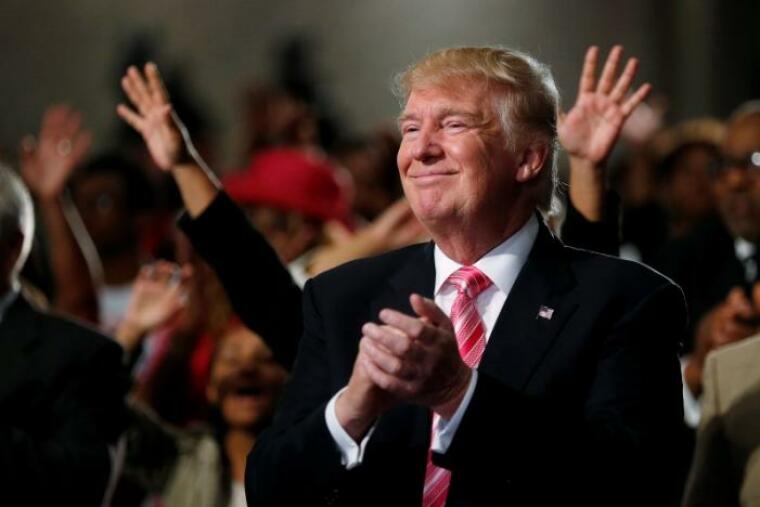'Notional' Christians are the driving force behind Trump victory, Barna poll finds

A new study conducted by The Barna Group has revealed that President-elect Donald Trump's victory can be attributed to 'notional' Christians instead of evangelicals.
The study was conducted in two waves from Nov. 4 to Nov. 6 and Nov. 9 to Nov. 16, with a total of 1,281 adult respondents that included 1,134 registered voters, according to The Christian Post.
George Barna, the founder of the group, defines notional Christians as people who consider themselves Christians but have not made "a personal commitment to Jesus Christ that is still important in their life today." It is said to be the largest of the faith segments which includes evangelicals, non-evangelical born-again Christians, non-Christians, and skeptics.
Since 1996, Democratic candidates have gained an average of 58 percent of the votes from 'notional' Christians. But this election year, Trump won 49 percent while Hillary Clinton only took 47 percent.
According to the report, evangelicals, representing seven percent of total voters, were one of the most ardent supporters of Trump. The president-elect got 79 percent of the evangelical vote, which is slightly lower than the support for Mitt Romney who garnered 81 percent when he ran in 2012.
The figures for Trump suggest that the evangelical support for a Republican candidate is at its lowest level since 1996 when Bob Dole garnered only 74 percent of their votes and lost to Bill Clinton.
"One of those misdiagnoses was their assertion that the election featured a record-breaking turnout among evangelicals. While their turnout was strong, it was not record-breaking," said Barna in a statement.
"In fact, evangelicals' concern over the character of both candidates kept many of them from choosing a candidate until very late in the process, and a higher-than-usual proportion of them voted for the more liberal candidate," he continued.
Barna noted that Christians were more likely to support Trump than Clinton while non-Christians were more likely to support the former first lady. However, the results have shown that Trump gained 10 percentage points over Clinton among atheists and agnostics.
Barna noted that the role of faith in the election was significant, but he pointed out that the skeptic population is increasing while the born-again community is shrinking.
"That is a trend that will be a major challenge for conservative and Republican candidates in the future," Barna said.
 Christians don't have to affirm transgenderism, but they can’t express that view at work: tribunal
Christians don't have to affirm transgenderism, but they can’t express that view at work: tribunal Archaeology discovery: Medieval Christian prayer beads found on Holy Island
Archaeology discovery: Medieval Christian prayer beads found on Holy Island Presbyterian Church in America votes to leave National Association of Evangelicals
Presbyterian Church in America votes to leave National Association of Evangelicals Over 50 killed in 'vile and satanic' attack at Nigerian church on Pentecost Sunday
Over 50 killed in 'vile and satanic' attack at Nigerian church on Pentecost Sunday Ukrainian Orthodox Church severs ties with Moscow over Patriarch Kirill's support for Putin's war
Ukrainian Orthodox Church severs ties with Moscow over Patriarch Kirill's support for Putin's war Islamic State kills 20 Nigerian Christians as revenge for US airstrike
Islamic State kills 20 Nigerian Christians as revenge for US airstrike Man who served 33 years in prison for murder leads inmates to Christ
Man who served 33 years in prison for murder leads inmates to Christ


 Nigerian student beaten to death, body burned over ‘blasphemous’ WhatsApp message
Nigerian student beaten to death, body burned over ‘blasphemous’ WhatsApp message 'A new low': World reacts after Hong Kong arrests 90-year-old Cardinal Joseph Zen
'A new low': World reacts after Hong Kong arrests 90-year-old Cardinal Joseph Zen Iran sentences Christian man to 10 years in prison for hosting house church worship gathering
Iran sentences Christian man to 10 years in prison for hosting house church worship gathering French Guyana: Pastor shot dead, church set on fire after meeting delegation of Evangelicals
French Guyana: Pastor shot dead, church set on fire after meeting delegation of Evangelicals ‘Talking Jesus’ report finds only 6% of UK adults identify as practicing Christians
‘Talking Jesus’ report finds only 6% of UK adults identify as practicing Christians Mission Eurasia ministry center blown up in Ukraine, hundreds of Bibles destroyed: 'God will provide'
Mission Eurasia ministry center blown up in Ukraine, hundreds of Bibles destroyed: 'God will provide' Church holds service for first time after ISIS desecrated it 8 years ago
Church holds service for first time after ISIS desecrated it 8 years ago Burger King apologizes for 'offensive campaign' using Jesus' words at the Last Supper
Burger King apologizes for 'offensive campaign' using Jesus' words at the Last Supper Uganda: Muslims abduct teacher, burn him inside mosque for praying in Christ’s name
Uganda: Muslims abduct teacher, burn him inside mosque for praying in Christ’s name